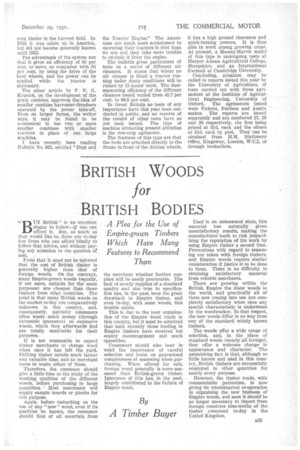BRITISH WOODS for BRITISH BODIES
Page 49

If you've noticed an error in this article please click here to report it so we can fix it.
A Plea for the Use of Empire-grown Timbers Which Have Many Features to Recommend Them
BUY British " is an excellent slogan to "follow—V one can afford it. But, as much as they would like to, there are to-day. few firms who can afford blindly to follow that advice, and without paying any attention to the question of cost s .
From that it must not be inferred that the: cost of British timber is generally higher than that of foreign :woods. On the contrary, many Empire-grown woods (equally, if .not more, suitable for the same purposes) are cheaper than those timbers from other countries. The point is that many British woods on the market to-day are comparatively unknown in this country, and, consequently, patriotic consumers often waste much money (through excusable ignorance) on expensive woods, which they afterwards find are totally unsuitable for their purposes.
It is not reasonable to expect timber merchants to change wood when once it has left the yard. Shifting timber entails much labour and valuable time, and no merchant cares to waste either of these. .
Therefore, the consumer should give a little time to the study of the working qualities of the different woods, before purchasing in large quantities. Most merchants will supply sample boards or planks for this purpose.
Again, before embarking on the use of any " new " wood, even if its qualities be known, the consumer should first of all ascertain from the merchant whether further supplies will he easily procbrable. The lack of steady supplies of a standard quality and size true to specification has, in the.past, been the great drawback to Empire timber, and even to-day, with some woods, this trouble exists.
This is due to the poor organization of the Empire wood trade in this country, but it must be admitted that until recently those trading in Empire timbers have received but scanty encouragement and much opposition.
Consumers should also bear in mind the importance of careful selection and insist on guaranteed completeness of seasoning when purchasing. When offered for sale, foreign wood generally is more seascaled than British-grown timber. Ignorance of this has, in the past, largely contributed to the failure of Empire wood. Used in an unseasoned state, this material has naturally given unsatisfactory results, making the manufacturer loath to risk jeopardizing the reputation of his work by using Empire timber a second time. Precautions with regard to seasoning are taken with foreign timbers, and Empire woods require similar consideration if justice is to be done to them. There is no difficulty in obtaining satisfactory material from reliable merchants.
There are growing within the British Empire the finest woods in the world, and practically all of them now coming into use are completely satisfactory when once any special characteristic is understood by the woodworker. In that respect, the new woods differ in no way from any of the standard widely known timbers.
The woods offer a wide range of selection, and, in the place of standard woods (nearly all foreign), they offer a welcome change in appearance and character. The astonishing fact is that, although so little known and used in this country, British timbers are Successfully employed in other cpuntries for nearly every purpose.
However, the timber trade, with commendable patriotism, is now giving its wholehearted co-operation in organizing the new business of Empire woods, and soon it should be no longer necessary to import from foreign countries nine-tenths of the timber consumed to-day in the United Kingdom.
By
A Timber Buyer




























































































